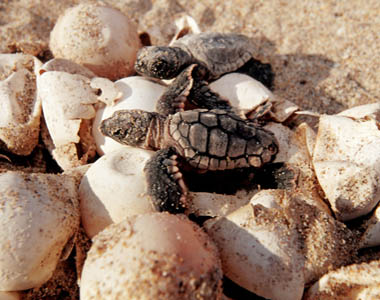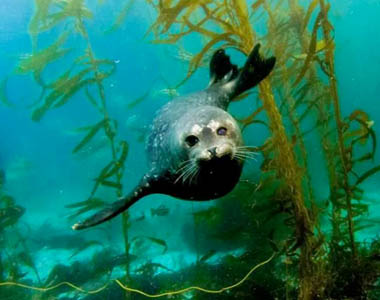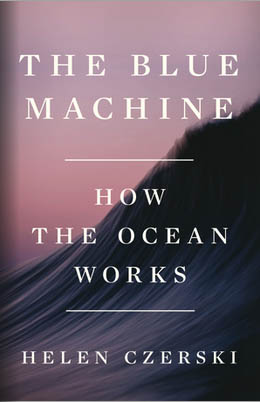 | | | On November 30th, COP28, the annual climate conference, begins in Dubai. Previous COPs have resulted in historic climate achievements, like the adoption of the Kyoto Protocol and the Paris Agreement. This year’s conference will include the second Ocean Pavilion to highlight the importance of the ocean in mitigating climate change. As the international summit begins, the RCC Coasts and Oceans Observer reviews the latest news in ocean and coastal conservation to offer critical perspective on the role of the ocean and the climate crisis. Oceans hold many climate solutions, but also face negative impacts of warming temperatures. For example, increased global temperatures have led to higher wave energy. This finding has implications for coastal communities, who face more intense and damaging storms. The climate crisis has also affected the fishing industry. In the Gulf of Maine, lobster ranges have shifted in response to increasing temperatures, threatening a livelihood and culture of lobstering.  Warming waters continue to threaten other marine species. While endangered sea turtles in several states had a record number of nests this year, they are still highly susceptible to climate change impacts after hatching. Deep water coral reefs in the Flower Garden Banks National Marine Sanctuary off the Texas coast are thriving despite a summer of record-breaking temperatures in the Gulf of Mexico which devastated many other reef systems. However, scientists warm that these reefs may not be sheltered from the impacts of ocean warming for much longer. Warming waters continue to threaten other marine species. While endangered sea turtles in several states had a record number of nests this year, they are still highly susceptible to climate change impacts after hatching. Deep water coral reefs in the Flower Garden Banks National Marine Sanctuary off the Texas coast are thriving despite a summer of record-breaking temperatures in the Gulf of Mexico which devastated many other reef systems. However, scientists warm that these reefs may not be sheltered from the impacts of ocean warming for much longer. Aside from rising temperatures, plastic pollution has also devastated marine ecosystems. Earlier this month, a dead Gervais’ beaked whale calf washed ashore in North Carolina after eating a plastic balloon. Other plastic products like straws are also commonly ingested by marine animals. But this month has also brought good news for marine conservation. In the Northeast Canyons and Seamounts Marine National Monument off the coast of Massachusetts, for example, the New England Aquarium spotted a sperm whale calf for the first time.  While marine protected areas as in the Northeast Canyons and Seamounts have been effective, they are vulnerable to climate change as marine heatwaves are expected to cause shifts in species’ ranges. Researchers from California designed a network of marine protected areas for kelp forests to increase climate resilience in ocean conservation. While marine protected areas as in the Northeast Canyons and Seamounts have been effective, they are vulnerable to climate change as marine heatwaves are expected to cause shifts in species’ ranges. Researchers from California designed a network of marine protected areas for kelp forests to increase climate resilience in ocean conservation.
Recently, the U.S. has also made great strides toward a renewable energy future. An offshore wind farm in Virginia was approved by the Biden Administration. It is estimated that the project will power as many as 660,000 homes. The Department of Energy is also working with other federal institutions to help support the transition to renewable energy in small coastal communities. And, in our “Books” section we highlight The Blue Machine by Helen Czerski, a fascinating read on why the ocean is central to all life on Earth from plankton to giant sea turtles, whales, and humankind. That’s why the world’s oceans are at the forefront of many of the most pressing climate issues that international representatives will discuss over the next two weeks at COP28. This month’s news serves as a reminder that we must support and expand ocean conservation efforts for the benefit of marine ecosystems and our entire planet. | | | | | | | |  Emma Brentjens - RCC National Environment Leadership Fellow (Presidential) Emma Brentjens - RCC National Environment Leadership Fellow (Presidential)
Emma Brentjens is the co-lead of the RCC Coasts and Oceans program. She is a Master of Environmental Management student at Duke University studying Ecosystem Science and Conservation and Community-based Environmental Management. | | | | | | Ocean Pavilion Returns to UN Climate Conference and Calls On Ocean Science to Lead Climate Solutions A group of the world’s leading ocean scientific, philanthropic, and other stakeholder organizations, led by the Woods Hole Oceanographic Institution (WHOI) and Scripps Institution of Oceanography at the University of California San Diego, have come together to highlight the global ocean at the upcoming 28th Conference of the Parties (COP28) in Dubai, United Arab Emirates, Nov. 30 – Dec. 12, 2023. | | | | | | | | Baby Whale Alert: Sperm Whale and Calf Spotted in New England’s Ocean Haven A sperm whale mom and her calf were spotted swimming in the Northeast Canyons and Seamounts--a first for New England Aquarium scientists While the mother may not realize she was being watched by scientists far above in a small plane, this siting is an exciting one for the Aquarium team–it’s the first time they’ve spotted a sperm whale baby during an overflight of the Canyons. | | | | | | | | Many Marine Reserves Aren’t Built For a Hotter Planet. Now There’s a Guide to Fix That. A team of scientists mapped out a series of kelp forest “stepping stones” calibrated to where habitat will exist and how species might move. The Pacific waters that hug the coastlines of California and Mexico’s Baja California peninsula teem with wildlife. Great white sharks and killer whales patrol the waters of the Channel Islands. Vast 30-meter-tall kelp forests, home to everything from starfish to sea otters to gray whales, span the 800 kilometer-long waters known as the California Bight. | | | | | | | | Florida Sees Record Year For Sea Turtles, But Climate Change Threatens Survival Just as they have for millions of years, sea turtles by the thousands made their labored crawl from the ocean to U.S. beaches to lay their eggs over the past several months. This year, record nesting was found in Florida and elsewhere despite growing concern about threats from climate change. In Florida, preliminary state statistics show more than 133,840 loggerhead turtle nests, breaking a record set in 2016. Same for green turtles, where the estimate of at least 76,500 nests is well above the previous mark set in 2017. | | | | | | | | This Scientist Uses Drones and Algorithms to Save Whales — and the Rest of the Ocean Just yards from the Fish 1, a 22-foot research vessel, a humpback whale about twice the size of the boat hurled itself out of the water, sending shimmering droplets in a broken necklace of splash. In the other direction, a hulking cargo ship, stacked high with containers, crept closer. Aboard the Fish 1, a slight figure whose face is crinkled from years in the sun and saltwater, looked from one to the other. | | | | | | | | Coral Reefs Off Texas Coast Thriving Far off the Texas coast there is a beautiful surprise in the Gulf of Mexico that draws divers from around the world: a stunning amount of coral coverage on undersea mountains. Sheltered in deep, cool habitat about 100 miles from shore, the coral reefs found in the Flower Garden Banks National Marine Sanctuary are among the healthiest in the world. But scientists say that like all reefs, they are fragile, and their location will only offer protection for so long in the face of a warming climate. | | | | | | | | ‘Catastrophic crisis’: Imported Shrimp Flood US Market Foreign shrimp imports are overwhelming the country’s inventories of shrimp and driving market prices for locally sourced shrimp to record lows, prompting widespread calls from elected officials and organizations throughout southern Atlantic and Gulf Coast states for the federal government to declare a fishery resource disaster. Governors of coastal states from North Carolina to Florida to Texas are being pressed to ask U.S. Commerce Secretary Gina Raimondo to determine a fishery resource disaster for the South Atlantic and Gulf of Mexico shrimp fishery. | | | | | | | | A ‘whole way of life’ at Risk as Warming Waters Change Maine's Lobster Fishing ABOARD THE FISHING VESSEL SHEARWATER ‒ Lobsterwoman Krista Tripp doesn't need a scientist to tell her the normally cold waters off the coast of Maine are warming. The submersible thermometer she takes on every fishing trip proves that. But it's not just the warmer water that's changing fishing here on the rocky coast of northern New England. Heavy rains are lowering the ocean's salinity. And warm-water fish that don't belong keep showing up. | | | | | | | | Massive Windfarm Project to Be Built Off Virginia Coast Gains Key Federal Approval A power company’s plans for an enormous offshore wind farm off Virginia's southeast coast have received key federal approval A power company's plans for an enormous offshore wind farm off Virginia's coast gained key federal approval Tuesday after the Biden Administration evaluated the project's potential impact on the environment. | | | | | | | | Ocean Energy Could Be a Golden Thread for Coastal Communities Community-Led Clean Energy Transitions Will Help Pave the Way to Energy Security and Grid Resilience in the Face of Climate Change. Kanaloa, god of the ocean, is considered one of the most important deities in ancient Hawaii’s major pantheon. He affects ocean animals, wave patterns, and currents. Mythical figures like Kanaloa are not just characters in ancient stories—they are also symbols of ancestral memory, environmental wisdom, and a deep connection between people and our Earth. | | | | | | | | New Study Finds That Ocean Waves Are Gaining Strength Because of Climate Change A long time ago, in 2017, I wrote a short fiction story called This Is the Dystopian Future of Surf. It was set in the future, where wave pools were everywhere and the ocean was too toxic to surf. Storms had gotten so violent that entering the ocean was basically a death sentence. “The storms got bigger and bigger as the ocean warmed and messed with the currents, great swathes of cold ramming into greater swathes of warm, throwing off the delicate equilibrium that controls the planet’s weather.” | | | | | | | | | | Beaked Whale Calf’s Death Attributed to Plastic Pollution Scientists who performed a necropsy on the Gervais’ beaked whale removed a crumpled-up plastic balloon that had obstructed the calf’s gastrointestinal tract, ultimately causing its death, according to a University of North Carolina Wilmington release. The whale, a nursing, female calf just under 11 feet long, was first spotted by beachgoers in shallow waters, before eventually washing onto the beach and shortly dying thereafter on Oct. 30. | | | | | | | | Ride the Wave of Ocean Conservation With Local Nonprofit Connecting Kids to Their Environment As a kid, Janaira Quigley had a personal mission: grow trees everywhere she went. A hippie at heart, she was always interested in science, and her family had their own fruit trees in their yard, so she wanted to scatter seeds that would grow into trees lining her walk to school, in the spaces outside her neighborhood, and beyond. | | | | | | | | Last of the Reef Netters: Decline of an Indigenous, Sustainable Salmon Fishery “Some mornings, the sun’s hitting that reef net just right and it’s like I know it’s talking to me,” said Ellie Kinley, a member of the Lummi (Lhaq’temish) Nation and the last Indigenous permit holder of an ancient salmon-fishing practice. Her reef net rig, parked on the shore of Lummi Nation, serves as a reminder of a once-thriving Indigenous fishing tradition that, for now, sits idle. “It’s saying, ‘I’m sitting here. Don’t forget about me.'” For centuries, Indigenous people of the Salish Sea relied on reef netting as a sustainable salmon-fishing technique. | | | | | | | | The Blue Machine How the Ocean Works by Helen Czerski (Author, University College London) A Financial Times Best Science Book of 2023 A scientist’s exploration of the "ocean engine"—the physics behind the ocean’s systems—and why it matters.  All of Earth’s oceans, from the equator to the poles, are a single engine powered by sunlight, driving huge flows of energy, water, life, and raw materials. In The Blue Machine, physicist and oceanographer Helen Czerski illustrates the mechanisms behind this defining feature of our planet, voyaging from the depths of the ocean floor to tropical coral reefs, estuaries that feed into shallow coastal seas, and Arctic ice floes. All of Earth’s oceans, from the equator to the poles, are a single engine powered by sunlight, driving huge flows of energy, water, life, and raw materials. In The Blue Machine, physicist and oceanographer Helen Czerski illustrates the mechanisms behind this defining feature of our planet, voyaging from the depths of the ocean floor to tropical coral reefs, estuaries that feed into shallow coastal seas, and Arctic ice floes.
Through stories of history, culture, and animals, she explains how water temperature, salinity, gravity, and the movement of Earth’s tectonic plates all interact in a complex dance, supporting life at the smallest scale—plankton—and the largest—giant sea turtles, whales, humankind. From the ancient Polynesians who navigated the Pacific by reading the waves, to permanent residents of the deep such as the Greenland shark that can live for hundreds of years, she introduces the messengers, passengers, and voyagers that rely on interlinked systems of vast currents, invisible ocean walls, and underwater waterfalls.
Most important, however, Czerski reveals that while the ocean engine has sustained us for thousands of years, today it is faced with urgent threats. By understanding how the ocean works, and its essential role in our global system, we can learn how to protect our blue machine. Timely, elegant, and passionately argued, The Blue Machine presents a fresh perspective on what it means to be a citizen of an ocean planet.  | | | | | |  The Rachel Carson Council Depends on Tax-deductible Gifts From Concerned Individuals Like You. Please Help If You Can. The Rachel Carson Council Depends on Tax-deductible Gifts From Concerned Individuals Like You. Please Help If You Can. | | | | | | | |  Sign Up Here to Receive the RCC E-News and Other RCC Newsletters, Information and Alerts. Sign Up Here to Receive the RCC E-News and Other RCC Newsletters, Information and Alerts. | | | | | | | | | | | |